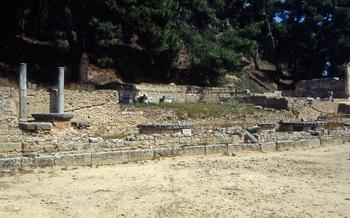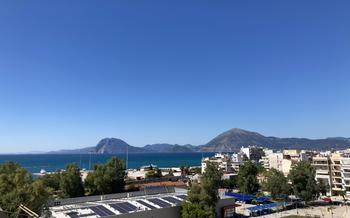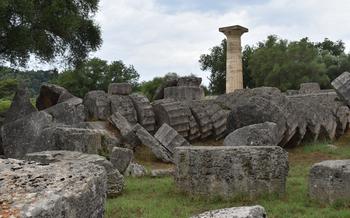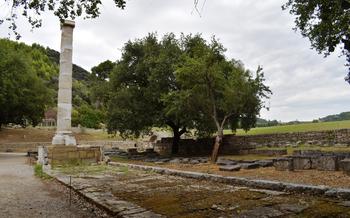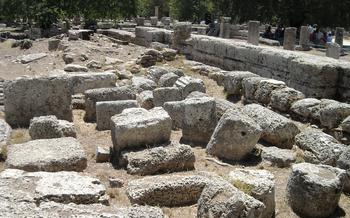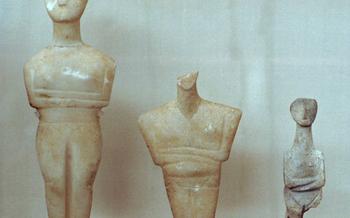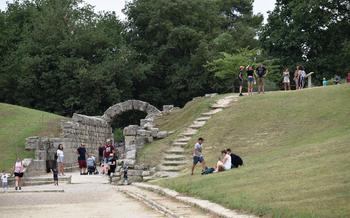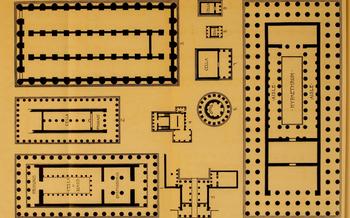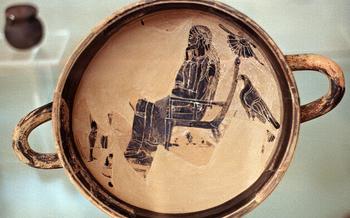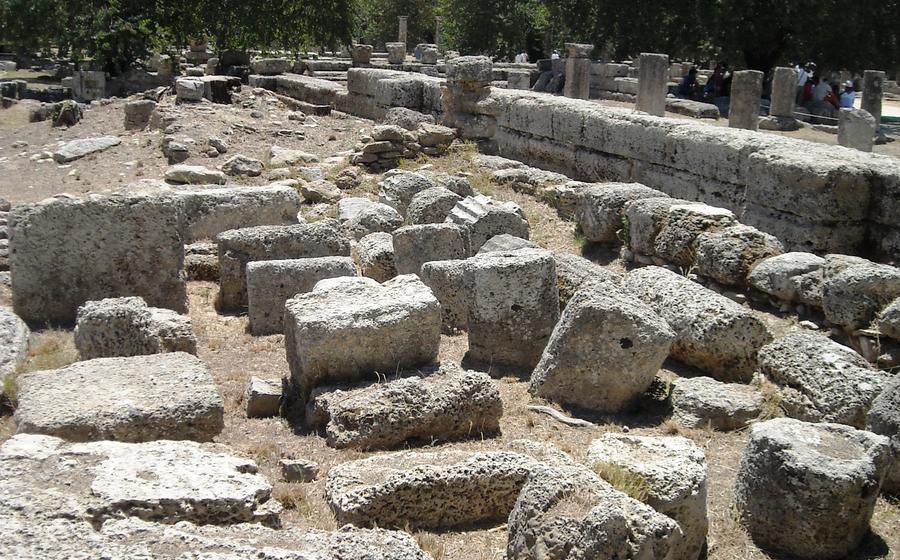
Ancient Arcadia Experience
- Unveiling Olympia: Antiquity's Cradle and Olympic Games' Birthplace
- Temple of Zeus: Awe-Inspiring Symbol of Divine Power
- Architectural Marvel
- Statue of Zeus
- Historical Context
- Modern-Day Significance
- Altis: The Sacred Precinct of Olympia
- Ancient Stadium: Witnessing the Birthplace of Olympic Contests
- Sporting Legacy: The Original Venue for Ancient Olympics
- Architectural Features: Design and Construction
- Athletic Competitions: Picturing Ancient Contests
- Modern-Day Events: Reviving the Ancient Spirit
- Museum of Olympia: A Treasury of Ancient Artifacts
- Valley of the Kladeos River: Nature's Oasis
- Ancient Olympia Archaeological Site: A Journey Through Time
- Olympia Festival: Reviving the Spirit of Ancient Games
- Local Cuisine: A Taste of Ancient Arcadia
- Nearby Attractions: Exploring Beyond Olympia
- Accommodation: Resting Among Ancient Wonders
- Transportation: Navigating Olympia and Beyond
- Budget Tips: Experiencing Olympia Affordably
- Insider Tip: Unveiling Hidden Gems
Unveiling Olympia: Antiquity's Cradle and Olympic Games' Birthplace
Olympia, nestled in the picturesque Peloponnese region of Greece, holds an unparalleled significance in the annals of human history. This ancient city served as the birthplace of the Olympic Games, the most celebrated sporting event of the ancient world. Its origins can be traced back to the 8th century BC when the Games were first held to honor Zeus, the king of the gods. Over time, Olympia evolved into a sacred sanctuary, attracting athletes, spectators, and pilgrims from across the Greek world. The city's archaeological treasures, including awe-inspiring temples, stadiums, and monuments, stand as testaments to its glorious past and enduring legacy. Today, Olympia remains a vibrant destination, offering a captivating blend of ancient history, archaeological wonders, and modern-day attractions, inviting visitors to immerse themselves in the birthplace of the Olympic spirit.
Temple of Zeus: Awe-Inspiring Symbol of Divine Power
The Temple of Zeus, the most prominent structure in ancient Olympia, stands as a testament to the architectural prowess and religious devotion of the ancient Greeks. Built in the 5th century BC, this Doric-style temple was dedicated to Zeus, the king of the gods, and housed one of the Seven Wonders of the Ancient World: the colossal Statue of Zeus.
Architectural Marvel
The Temple of Zeus is an architectural marvel, showcasing the refined craftsmanship and engineering skills of the ancient Greeks. Constructed from local limestone, the temple features a peristyle of 6 x 13 columns, each standing over 10 meters tall. The intricate carvings on the columns and pediments depict mythological scenes and the labors of Hercules, adding to the temple's grandeur.
Statue of Zeus
Inside the temple stood the awe-inspiring Statue of Zeus, a masterpiece crafted by the renowned sculptor Phidias. Made from ivory and gold, the statue depicted Zeus seated on a throne, holding a scepter and a statue of Nike, the goddess of victory. The statue's majestic presence and intricate details left visitors in awe and solidified Phidias' reputation as one of the greatest artists of antiquity.
Historical Context
The Temple of Zeus held deep religious significance for the ancient Greeks. Zeus was the supreme deity in the Greek pantheon, and the temple served as a place of worship and pilgrimage. The statue of Zeus was considered a representation of the god himself, and it was believed that those who beheld it would be blessed with good fortune.
Modern-Day Significance
The Temple of Zeus, though in ruins, remains an iconic symbol of ancient Greece and a testament to the enduring legacy of classical architecture. Its grandeur and historical significance continue to captivate visitors, making it a must-see attraction in Olympia. The temple's influence on subsequent architectural styles, including Roman and Renaissance architecture, is evident in many buildings around the world.
Altis: The Sacred Precinct of Olympia
At the heart of Olympia lies the Altis, a sacred precinct dedicated to the Greek gods and goddesses. This sprawling complex served as the ceremonial and ritualistic center of the ancient Olympic Games. As you step into the Altis, you will be surrounded by a cluster of temples, altars, and statues, each holding a unique significance in ancient Greek religious practices.
-
Central Gathering Place: The Altis was the focal point of religious ceremonies and rituals during the Olympic Games. Here, athletes, spectators, and pilgrims gathered to honor the gods and goddesses, seeking their blessings and protection. It was a place where the sacred and the profane intertwined, creating an atmosphere of awe and reverence.
-
Notable Monuments: Within the Altis, you will find an array of remarkable monuments that showcase the architectural prowess of ancient Greece. The Temple of Zeus, with its colossal statue of the god, dominates the precinct. The Temple of Hera, dedicated to Zeus' wife, stands nearby, showcasing a different architectural style. Other notable structures include the Philippeion, a circular monument built by Philip II of Macedon, and the Prytaneion, where the Olympic flame was kept alight.
-
Archaeological Insights: The Altis has been extensively excavated, revealing a treasure trove of artifacts that shed light on ancient Greek religious practices. Sculptures, inscriptions, and votive offerings have been unearthed, providing valuable insights into the rituals, beliefs, and traditions of the ancient Greeks. These discoveries have helped us reconstruct the vibrant religious landscape of Olympia and gain a deeper understanding of the significance of the Olympic Games in ancient Greek society.
-
Modern-Day Experience: Walking among the ruins of the Altis today, you can still feel the presence of the ancient Greeks. Imagine the processions of athletes and pilgrims, the chanting of priests, and the roar of the crowd as the Olympic contests unfolded. The Altis is a place where history comes alive, where you can connect with the spirit of ancient Olympia and immerse yourself in the grandeur of the Olympic Games.
Ancient Stadium: Witnessing the Birthplace of Olympic Contests
In the heart of Olympia lies the ancient stadium, a testament to the birthplace of the Olympic Games, the most celebrated sporting event in antiquity. Constructed in the 5th century BC, this impressive arena once hosted the athletic competitions that drew athletes and spectators from across the Greek world.
Sporting Legacy: The Original Venue for Ancient Olympics
The ancient stadium, with its elongated U-shape, served as the original venue for the Olympic Games. Here, athletes from various city-states competed in footraces, wrestling, boxing, and other athletic contests. The victors were crowned with olive wreaths and hailed as heroes upon their return home.
Architectural Features: Design and Construction
The ancient stadium showcases remarkable architectural features that reflect the ingenuity of ancient Greek builders. The starting line, known as the "aphētis," marks the beginning of the races. The stadium's seating arrangements, carved into the hillside, provided ample space for spectators to witness the thrilling competitions.
Athletic Competitions: Picturing Ancient Contests
As you stand within the ancient stadium, let your imagination transport you back to the days of ancient Olympia. Picture the athletes, clad in simple tunics, poised at the starting line, ready to unleash their speed and strength. The crowd erupts in cheers as the runners burst forth, their footsteps echoing through the stadium.
Modern-Day Events: Reviving the Ancient Spirit
Today, the ancient stadium continues to host sporting events and cultural performances, echoing the spirit of the ancient Olympic Games. Witness contemporary footraces and wrestling matches that pay homage to the athletic traditions of old. Experience the magic of theater and music performances set against the backdrop of this historic venue.
Museum of Olympia: A Treasury of Ancient Artifacts
The Museum of Olympia is a treasure trove of ancient artifacts, offering visitors a glimpse into the rich history and culture of Olympia. The museum's collection includes a vast array of sculptures, pottery, and other artifacts excavated from the ancient site. These artifacts provide valuable insights into the religious beliefs, daily life, and artistic achievements of the ancient Greeks.
One of the highlights of the museum is the collection of sculptures, which includes masterpieces such as the Hermes of Praxiteles and the Nike of Paeonius. These sculptures are renowned for their exquisite craftsmanship and their ability to capture the essence of the human form. The museum also houses a large collection of pottery, ranging from simple household items to elaborately decorated vases. These vases often depict scenes from Greek mythology or everyday life, providing historians with valuable information about ancient Greek culture.
In addition to its collection of sculptures and pottery, the Museum of Olympia also houses a number of other artifacts, such as coins, jewelry, and tools. These artifacts provide a fascinating glimpse into the economic, social, and technological aspects of life in ancient Greece. The museum also features a number of interactive exhibits that allow visitors to learn more about the history and culture of Olympia in a fun and engaging way.
The Museum of Olympia is a must-visit for anyone interested in ancient Greek history and culture. Its collection of artifacts is unparalleled, and the museum's exhibits are both informative and engaging. A visit to the museum is a truly unforgettable experience that will leave you with a deep appreciation for the rich heritage of Olympia.
Valley of the Kladeos River: Nature's Oasis
Nestled amidst the historical grandeur of Olympia, the Valley of the Kladeos River unveils a breathtaking tapestry of natural wonders. As you venture into this serene sanctuary, lush greenery carpets the landscape, while the meandering river glistens under the radiant Greek sun. Majestic mountains encircle the valley, painting a panoramic backdrop that will leave you in awe.
Beyond its scenic beauty, the Valley of the Kladeos River holds deep significance for ancient Greeks. They revered it as a sacred place, imbued with spiritual energy. It was here that they sought solace, communion with nature, and divine inspiration. As you explore the valley, you can almost feel the echoes of ancient rituals and prayers that once permeated the air.
Archaeological discoveries in the valley have unearthed lesser-known ruins and remnants of ancient settlements. These hidden treasures offer a glimpse into the lives of the people who inhabited this region centuries ago. Take the time to explore these sites and uncover the fascinating stories they hold.
If you're an outdoor enthusiast, the Valley of the Kladeos River is your playground. Lace up your hiking boots and embark on invigorating trails that wind through the valley's diverse terrain. Feel the crunch of gravel beneath your feet as you ascend gentle slopes, and be rewarded with breathtaking vistas that stretch for miles. For a more leisurely experience, rent a bicycle and pedal along the riverbank, immersing yourself in the tranquility of nature.
Birdwatching enthusiasts will delight in the valley's rich avian diversity. Keep your binoculars at the ready as you spot colorful warblers, majestic eagles soaring overhead, and a symphony of other feathered creatures that call this valley home. Whether you're a seasoned naturalist or simply seeking a peaceful retreat, the Valley of the Kladeos River offers a sanctuary where you can reconnect with nature and create lasting memories.
Ancient Olympia Archaeological Site: A Journey Through Time
Step into the past as you explore the ancient ruins of Olympia, a place where history comes alive.
Guided Tours:
- Embark on a journey with knowledgeable guides who will bring the ancient world to life.
- Delve into the history, mythology, and significance of each monument and artifact.
- Gain insights into the lives of the ancient Greeks and their Olympic traditions.
Self-Guided Exploration:
- Wander through the ruins at your own pace, immersing yourself in the tranquility of the site.
- Use guidebooks or audio tours to learn about the various landmarks and their stories.
- Discover hidden corners and capture stunning photographs of the ancient wonders.
Interactive Experiences:
- Enhance your visit with augmented reality apps that overlay 3D reconstructions onto the ruins.
- Take virtual reality tours that transport you back in time to witness the ancient Olympic Games.
- Engage with interactive exhibits that bring the past to life through touchscreens and multimedia displays.
Accessibility:
- Ancient Olympia is committed to ensuring accessibility for all visitors.
- Wheelchair ramps and accessible pathways allow visitors with disabilities to explore the site with ease.
- Braille signage and audio guides provide information for visually impaired visitors.
- Sign language interpretation is available upon request for visitors with hearing impairments.
Olympia Festival: Reviving the Spirit of Ancient Games
Olympia Festival is an extraordinary cultural extravaganza that breathes life into the heritage of the Olympic Games, transporting visitors back to the era of ancient Greece. This vibrant festival showcases traditional Greek sports and athletic competitions, echoing the spirit of the original Olympic contests. The air fills with excitement as participants and spectators alike immerse themselves in the fervor of these timeless events.
Beyond sports, the festival offers a rich tapestry of artistic performances, drawing inspiration from ancient Greek culture. Music, dance, and theater converge to create mesmerizing spectacles that captivate audiences. The festival also fosters a sense of community, bringing together locals and travelers from around the world who share a fascination for ancient Greece. This immersive cultural experience provides a unique opportunity to connect with the past and celebrate the enduring legacy of the Olympic Games.
Local Cuisine: A Taste of Ancient Arcadia
Olympia's culinary scene is a testament to the region's rich history and agricultural abundance. Indulge in traditional dishes like koulouri, a sesame-encrusted bread ring, and tzatziki, a refreshing yogurt-based sauce with cucumber and garlic. Savor moussaka, a hearty casserole made with layers of eggplant, potatoes, and minced meat, topped with a creamy béchamel sauce.
Explore local markets and farms to discover the region's culinary treasures. Freshly picked fruits, vegetables, and herbs fill the stalls, offering a vibrant array of colors and flavors. Engage with local farmers and learn about their sustainable farming practices that have been passed down through generations.
Immerse yourself in the local cuisine by participating in cooking classes. Under the guidance of experienced chefs, you'll learn to prepare traditional Greek dishes using fresh, local ingredients. Discover the secrets of Greek cuisine and recreate these culinary delights in your own kitchen.
Embark on food tours or cooking workshops to delve deeper into the culinary heritage of Olympia. These immersive experiences allow you to sample a variety of regional specialties, meet local food artisans, and gain insights into the culinary traditions that have shaped the region's cuisine.
Nearby Attractions: Exploring Beyond Olympia
Olympia, the birthplace of the Olympic Games, is surrounded by a wealth of other ancient wonders, each with its unique story to tell. Ancient Corinth, a short drive from Olympia, boasts impressive ruins that showcase Corinth's significance as a major city-state in ancient Greece. Explore the well-preserved Temple of Apollo, the ancient Agora, and the remains of the Isthmian Games stadium.
Mycenae, another nearby gem, takes you back to the Bronze Age. Discover the awe-inspiring Lion Gate, the royal tombs, and the Cyclopean walls that once protected this powerful kingdom. Unravel the mysteries of the Mycenaean civilization and its legendary ruler, Agamemnon.
Epidaurus, renowned for its remarkably preserved ancient theater, is a must-visit for theater enthusiasts. Marvel at the theater's exceptional acoustics and witness the architectural brilliance that allowed ancient performances to be heard by every spectator. Take a moment to appreciate the surrounding countryside, dotted with olive groves and vineyards.
Finally, don't miss the charming coastal town of Nafplio, with its Venetian and Ottoman influences. Explore the picturesque Palamidi Fortress, stroll along the scenic waterfront promenade, and indulge in delicious seafood dishes at one of the many tavernas. Nafplio's vibrant atmosphere and rich history make it a perfect complement to your exploration of ancient Greece.
Accommodation: Resting Among Ancient Wonders
Olympia offers a range of accommodation options to suit every traveler's needs and budget. For those seeking proximity to the archaeological site, numerous hotels and guesthouses are located within walking distance, providing easy access to the ancient wonders. Alternatively, consider immersing yourself in the local culture by staying in one of the traditional villages surrounding Olympia, where you can experience authentic Greek hospitality and indulge in delicious regional cuisine.
For travelers seeking a more independent experience, camping is a fantastic option. Designated camping areas allow you to embrace the natural beauty of the region while enjoying the convenience of being close to the ancient site. For those desiring a touch of luxury, private villas and apartments offer a more personalized stay, providing ample space and privacy.
Transportation: Navigating Olympia and Beyond
Olympia is well-connected to major cities in Greece, making it accessible by public transportation. Buses and trains offer regular service to Olympia from Athens, Patras, and other regional hubs. For a more flexible and independent travel experience, renting a car is a popular option, allowing you to explore the region at your own pace. Guided tours are also available, providing transportation and expert commentary, making it an excellent choice for those seeking a comprehensive and hassle-free experience. To ensure a smooth arrival and departure, convenient airport transfers can be arranged between Olympia and nearby airports, including Kalamata International Airport and Athens International Airport.
Budget Tips: Experiencing Olympia Affordably
Olympia offers budget-friendly options for travelers who seek an enriching experience without breaking the bank. Consider visiting during the shoulder season (spring or fall) or off-season (winter) to avoid the peak tourist crowds and associated costs. Group discounts are often available for guided tours and admission fees, making it a cost-effective way to explore the ancient site. Students and seniors can take advantage of reduced rates with valid identification. Budget-conscious travelers can opt for hostels, guesthouses, or shared accommodations, which offer comfortable stays at a fraction of the cost of luxury hotels.
Insider Tip: Unveiling Hidden Gems
Olympia is not just about its famous ruins; it's also about uncovering hidden gems that reveal its lesser-known stories. Explore secret paths that lead to secluded corners and breathtaking viewpoints offering unique perspectives of the ancient site. Engage with local guides who are passionate about sharing hidden histories and can lead you to off-the-beaten-track locations that most tourists miss. Capture the magic of Olympia under the moonlight with a nighttime exploration, where the ancient ruins take on a new, ethereal charm. And don't forget to witness the mesmerizing sunset vistas from strategic vantage points that paint the sky in hues of gold and crimson, creating a perfect ending to your journey through ancient Arcadia.
